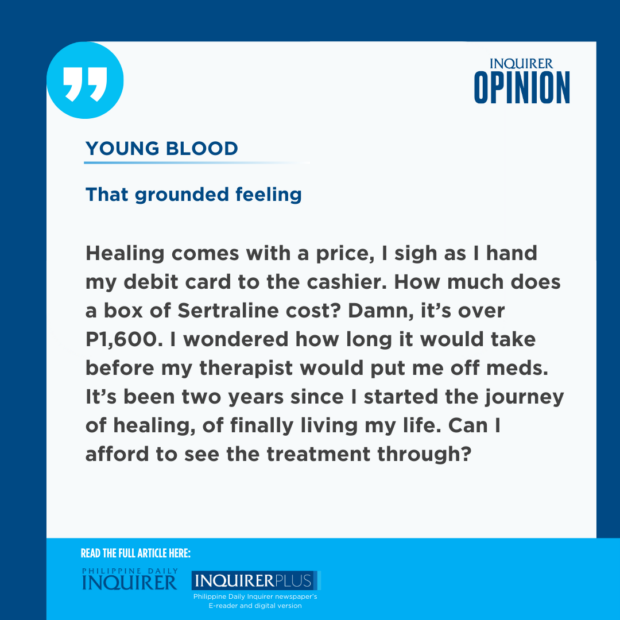That grounded feeling

The thing about seeking professional help is it can make you reliant on your meds. The thing about this statement is it scares people off.
“What if I get addicted to the meds?”
“Can I afford to see the treatment through?”
These questions become the biggest barriers for a Filipino to get therapized. And the truth is that they don’t get answered even after two years in therapy.
The first question came to me while walking down Makati Avenue after an office day in Ayala Triangle Gardens. Except, the question had a minor (yet significant) difference: What if I’ve become too addicted to my meds? I asked myself as I walked into the 6 p.m. rush hour, careful not to bump into city street runners, bikers, and fellow employees ending their work day.
With each step I took down the sidewalk, soft electric shocks pulsed through the nerves in my head, my arms, and down my back. Think touching a wire that’s “grounded,” as our elders put it, but in timed pulses. The shocks made me see double, made my vision throb, and got me disoriented—so much so that I almost bumped into a horde of sweaty runners with their smartwatches and designer rubber shoes.
It’s been two days since I last took Sertraline. It happens every once in a while, especially when my paycheck won’t allow it. By how often this happens, the neural electric shock is familiar to me now. It even has an official term: antidepressant discontinuation syndrome or “brain zaps,” colloquially.
Some researchers say it’s caused by the sudden drop in serotonin, while others attribute it to returning to the fight-and-flight default of one’s anxiety. Basically, it pulls you back to survival mode.
If that’s the case, are the stability and confidence I feel when I’m consistent with my meds a step up from survival? Is it, possibly, what “living” feels like?
If so, is this what they mean by the cost of living?
Spending P2,500 on each therapy session, P39 per tablet of SSRIs, an HMO that would only cover expenses that are practically life-or-death. All this while you work your third-world a** off for a White-person company.
Is this what life means? Is this what living looks like?
I admit I’ve been doing better since I went to therapy and started medicating. I’m less short-tempered yet more expressive, less self-sabotaging, and more mindful of my boundaries. I pursued graduate school out of my own volition and am doing my best to tick off goals for a very reachable promotion.
I’m living with the love of my life. In a home where no one shouts. Where there are no helicopter parents or neighbors you often see in church. I get to study when I want, watch pirated films when I want, and be in a place—for the first time ever—where I feel safe.
And yet…
All this comes with a price, I thought as I handed my beep card to the dispatcher of the P2P bound for home.
Should have I just booked a Grab home so I could rest? No, our rent is coming up.
A safe space comes with a price, I realize as I pay our bills while passing the time on the road.
Should I move back to the province to save on expenses? Is it a worthy trade-off for living alone? No, my life—and the opportunities for someone like me—are in the city now.
Learning comes with a price, I decide as I move money from my payroll account to the personal account I reserve for my graduate studies.
Should I just postpone my enrollment for another year? I could’ve used that money to support my siblings instead—wait, no. Your therapist said it’s not your job to parent your siblings—or anyone else, for that matter.
Healing comes with a price, I sigh as I hand my debit card to the cashier.
How much does a box of Sertraline cost? Damn, it’s over P1,600.
I wondered how long it would take before my therapist would put me off meds. It’s been two years since I started the journey of healing, of finally living my life.
Can I afford to see the treatment through?
No. I gave up too much to stop now. I’ve made so much progress. I’m finally, finally living well.
There is a great distance between my life now and the survival state I was in before. For that, I am grateful. It makes me feel like I’ve become a queer person who gained the privilege of choice.
And yet—through a series of brain zaps, through a pile of price tags—I wonder whether this really is a life.
Or have I just traded survival by endurance for survival by consumption?
—————-
Shom Mabaquiao, 26, is a junior editor for a behavioral insights company. He’s taking his master’s in psychology, with a focus on social psychology, at the University of the Philippines.
















